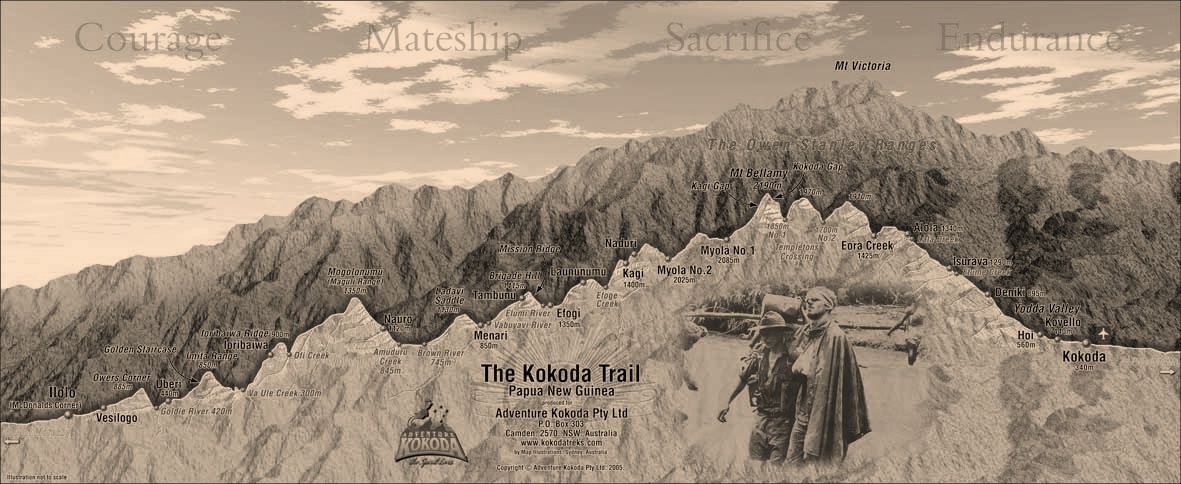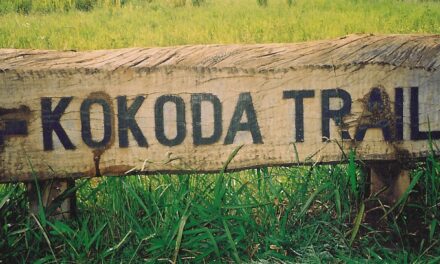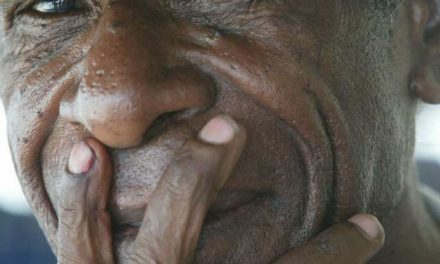In 1992 Prime Minister Paul Keating opened a $2 million Kokoda Memorial Hospital along with a Backpacker’s Hostel to commemorate the 50th anniversary of the Kokoda campaign.
It was also planned to open a new terminal at the Kokoda airfield, but the locals burnt it down shortly before his visit – it turned out to be an omen of things to come with a well-intentioned aid policy inadvertently reinforcing a ‘cargo-cult’ mentality.
Six-months after the opening of the Kokoda Memorial Hospital my trek group was blocked at Kovello, about an hour south of our destination at Kokoda. The villagers were upset because Kokoda got a new hospital and their Kokoda wan-toks got all the jobs while Kovello got nothing.
They were therefore demanding a similar ‘hospital and backpackers’ hostel for Kovello.
We were obviously not able to match these demands, but we did commit to helping build a new kindergarten and to employing some guides and porters from the village for our future treks. They then let us pass through.
Over the next decade we experienced similar blockades with similar demands.
It was soon clear to me that all they really wanted was a share of benefits from the increasing number of Kokoda tourists however neither of the two Provincial nor Local Level Government Council Wards had the capacity to assist at the time.
I therefore decided to use my company, Adventure Kokoda, to fund the establishment of a ‘Kokoda Track Foundation’(KTF) as a philanthropic body to link our shared military heritage with community benefits across the Trail.
I invited a number of people who had trekked with me over the previous 10 years to join the Board and enlisted the support of Templeton-Galt to develop a strategy for the emerging pilgrimage tourism industry. Kelvin Templeton was a mate and CEO of the Sydney Swans who had committed to sending key players across the Trail as part of their development. He also had a keen interest in indigenous history and art.
Kelvin enlisted the support of two colleagues, Dr Stephen Wearing from the University of Technology Sydney, a specialist in eco-tourism in Third World countries, and Paul Chatterton, Conservation Director of the the World Wide Fund for Nature in PNG.
The enthusiastic commitment of PNG officials, local councillors, clan leaders and villagers is evident in the record of proceedings.
Our purpose was to provide a template for both governments in Australia and PNG to use as a model for the development of the Kokoda Trail as a National Memorial Park based on our shared military heritage for the socio-economic benefit of traditional landowner communities across it.
We presented our Strategic Plan to PNGs Grand Chief and Prime Minister, Sir Michael Somare, at a function in Port Moresby on 30 June 2006, and to the Minister for Veterans Affairs, The Hon Danna Vale MP by mail.
In 2009 the Australian Government assumed responsibility for the management of the Trail under a Joint Understanding to assist PNG in obtaining a World Heritage listing for the area.
Since then, they have focused on the ‘environment’ and have not conducted a single village-based workshop across the Trail. Our shared military heritage has therefore been relegated; no management systems have been implemented; and trekker numbers have fallen by 46 percent.
The decline has resulted in a cumulative loss of some $19 million (K49 million) in foregone wages, campsite fees and local purchases for the subsistence villagers we have spent more than $60 million trying to help under our aid-funded ‘Kokoda Initiative’ program.
The Board I established for the Kokoda Track Foundation then elected to become an NGO to work wider afield in PNG on project not associated to our wartime heritage across the Kokoda Trail. The abreviated their name to ‘KTF’ and changed our logo feauting George Silk’s famous wartime picture of a wounded soldier being assisted by a ‘fuzzy-wuzzy angel’ – to a ‘butterfly’.
I then established a Network Kokoda charity which is focused on the wartime heritage of the Kokoda Trail – we since engaged Michael Pender, and accredited heritage architect to develop a ‘Funding Proposal for a Military Heritage Master Plan’.
The following .pdf file is a record of meetings and forums which led to identifying the needs of subsistence village communities across the Kokoda Trail and establishing partnerships to ‘Work Together for Good Tourism’.
We were hopeful the Australian Government would use it as a template for the conduct or regular village-based workshops to continue the engagement with village communities however this did not happen and local villagers are now mere spectators to a passing line of trekkers crossing their land.
As a result there is now an increasing desire for them to reclaim ownership of the Trail from the DFAT Kokoda Initiative in PNG.





